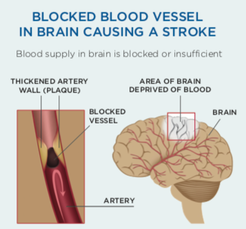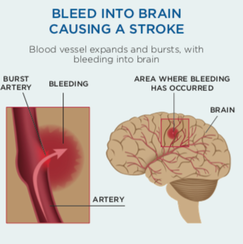|
What is a Stroke? What you need to know (a great resource from the Stroke Foundation https://www.stroke.org.nz/what-stroke) A stroke is a brain attack. It is very serious, but many people go on to recover and live healthy lives. A stroke happens when a blockage such as a clot blocks the blood flow to the brain, or when a burst blood vessel bleeds into the brain. Over 11,000 strokes are experienced each year – that’s one every 45 minutes. Stroke is New Zealand's second single biggest killer and the leading cause of serious adult disability. But many New Zealanders who have a stroke recover and lead successful, happy lives. A stroke is a brain attack A stroke is a sudden interruption of blood flow to part of the brain causing it to stop working and eventually damaging brain cells. During a stroke, the cells in the affected part of the brain start to die and that part of the brain cannot work properly. This can affect a person’s ability to walk, talk, eat, see, read, socialise or do things they were able to do before the stroke. Many people with stroke may also have fatigue or problems with remembering, understanding or thinking properly. This short video is an excellent explanation of what a stroke is (courtesy of HealthSketch). https://www.youtube.com/watch?v=ryIGnzodxDs&t=2s  Types of stroke Ischaemic stroke: This is the most common type of stroke, particularly in older people. An ischaemic stroke occurs when a clot blocks an artery in the brain. The clot usually forms in a small blood vessel inside the brain that has become narrowed through high blood pressure, high cholesterol, diabetes or smoking. Embolic stroke: This occurs when a blood clot or piece of plaque (cholesterol or calcium deposits) on the wall of an artery breaks loose and travels to the brain. When this happens, the flow of oxygen-rich blood to the brain is blocked and tissue is damaged or dies.  Haemorrhagic stroke: This occurs when an artery in the brain ruptures (bursts) and leaks blood into the brain (cerebral haemorrhage). This break in the blood pipeline means parts of the brain are deprived of blood and a stroke occurs. Blood irritates brain tissue, causing swelling and pressure, which cause further damage and loss of function. Subarachnoid haemorrhage (SAH) is when blood leaks into the surface of the brain. Intracranial haemorrhage (ICH) is when there is bleeding into the brain tissue itself. The impact of Stroke Different parts of the brain control a person’s movements, senses, emotions and intellectual functions. The effects of stroke depend on which part of the brain is damaged and how severe the damage is. Disabilities from stroke range from slight to severe. Some people make a speedy recovery and return to their normal lives. Others have disabilities that may improve with time and can be managed. For many, disabilities may last a lifetime. A small number of people will need full time medical care. Who does stroke affect? Stroke can affect people at any age. Although strokes often happen to older people, 25–30% of strokes are experienced by people under the age of 65 years. Stroke is largely preventable, yet each year about 11,000 strokes are experienced in this country. This number could be reduced by three quarters if all the recommended actions to reduce stroke risks were taken in the community. There is a list of facts and FAQs about stroke and treatment https://www.stroke.org.nz/facts-and-faqs The Stroke Foundation’s Life After Stroke section also takes you through treatment, rehabilitation, and what to expect after a stroke - we strongly recommend this free resource. If you have a relative who has had a stroke and you want additional rehabilitation or some support to improve life for you and them, our friendly therapists can help. Contact Email: [email protected] Phone: 03 377 5280 References
1 NZIER research report 2020: https://nzier.org.nz/static/media/filer_public/b4/6f/b46f7e92-be19-477d-b23c-7ba042d7cccd/social_and_economic_costs_of_stroke_-_2020_update.pdf 2 Ministry of Health (2018). Mortality and Demographic Data 2015, retrieved 14th August, 2018, from https://www.health.govt.nz/publication/mortality-2015-data-tables. 3 NZIER research report 2020: https://nzier.org.nz/static/media/filer_public/b4/6f/b46f7e92-be19-477d-b23c-7ba042d7cccd/social_and_economic_costs_of_stroke_-_2020_update.pdf Comments are closed.
|
AuthorShonagh O'Hagan Archives
July 2024
|

 RSS Feed
RSS Feed